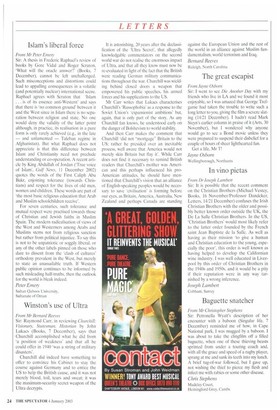Winston's use of Ultra
From Mr Bernard Reeves Sir: Raymond Carr, in reviewing Churchill: Visionary, Statesman, Historian by John Lukacs (Books, 7 December), says that Churchill accomplished what he did from 'a position of weakness' and that all he could offer in 1940 `was a string of military disasters'.
Churchill did indeed have something to offer to convince his Cabinet to stay the course against Germany and to entice the US to help the British cause, and it was not merely blood, toil, tears and sweat; it was the maximum-security secret weapon of the Ultra decrypts.
It is astonishing, 20 years after the declassification of the 'Ultra Secret', that allegedly knowledgable commentators on the second world war do not realise the enormous impact of Ultra, and that all they know must now be re-evaluated in light of the fact that the British were reading German military communications throughout the war. Churchill was wielding behind closed doors a weapon that empowered his public speeches, his armed forces and his supplications to the US.
Mr Can writes that Lukacs characterises Churchill's 'Russophobia' as a response to the Soviet Union's 'expansionist ambitions' but, again, that is only part of the story. As any Churchill fan knows, he understood early on the danger of Bolshevism to world stability.
Arid then Carr makes the comment that Churchill 'did not "mortgage" Britain to the US; rather he presided over an inevitable process, well aware that America would not merely skin Britain but flay it'. While Can does not find it necessary to remind British readers that Churchill's mother was American and this perhaps influenced his proAmerican attitudes, he should have mentioned that Churchill's vision that an alliance of English-speaking peoples would be necessary to save 'civilisation' is forming before our eyes, as Britain, America, Australia, New Zealand and perhaps Canada are standing
against the European Union and the rest of the world in an alliance against Muslim fundamentalism, world terrorism and Iraq.
Bernard Reeves
Raleigh, North Carolina


















































 Previous page
Previous page